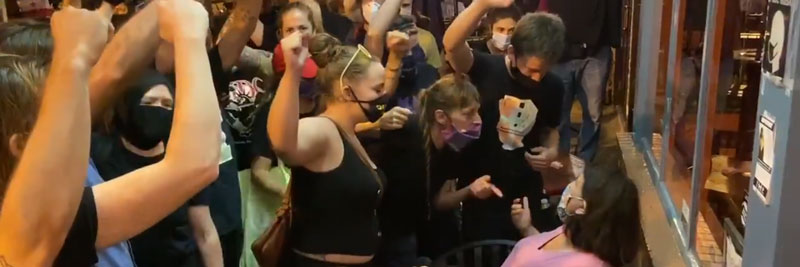The Circular Fiat of a Closed Fist

Increasingly, we’re being called upon to raise our fists as a show of solidarity. This is yet another way in which the zeitgeist of our times is demanding that we affirm a falsehood. Several falsehoods, actually.
The most direct is the notion that Western civilization is founded on and persistent in systemic racism. It is not. But a more subtle and more profound falsehood brings us to the deeper battles of humanity, on the plane of inner demons and better angels.
Namely, clenched fists are not a sign of solidarity, at least not the type of solidarity modern advocates claim to be promoting. In terms of social justice, the Catechism of the Roman Catholic Church provides a strong definition, quoting from Pope Pius XII as follows:
An error, “today abundantly widespread, is disregard for the law of human solidarity and charity, dictated and imposed both by our common origin and by the equality in rational nature of all men, whatever nation they belong to.”
The text goes on:
Solidarity… presupposes the effort for a more just social order where tensions are better able to be reduced and conflicts are more readily settled by negotiation.
Perhaps universally across humanity, a clenched fist is the opposite. It’s a sign of inner tension and an outward aggression. The idea modern radicals are striving to infuse into social justice and solidarity is older, arguably reactionary: solidarity with one group in opposition to another. That is the meaning of a closed fist.
Pick up any self-improvement book about communication strategies, and you’ll likely find sections about presenting with an open posture. They’ll encourage an open stance and open hands. That is a posture of solidarity. “I am open to what you have to say. I am interested in you, as a human being.”
When a mob of young adults surrounded and berated an outside diner in Washington, D.C., in August, they were not asking her to show her openness to all humanity. They were demanding that she take their side against another. Moreover, they have drawn a hard line by which solidarity with them means repudiation of the Other. Thus, those promoting so-called “anti-racism” hold that it is insufficient not to be racist; one must actively oppose those on whom they affix the patch of “racist.”
Providing this open check to solidarity hucksters is the price of being recognized as a human being. Just so did a Black Lives Matter recently refuse to speak with John DePetro, saying that he was the only journalist who had refused to pay that price.
Lindsay Iadeluca, of WJAR, channel 10, recently wrote on Twitter that, “Social justice isn’t a personal view. It’s human decency.” Such a statement from a journalist might be defensible under the Catechism’s definition of social justice. Under the activists’ oppositional, aggressive definition of “solidarity,” it is not.
What Iadeluca (or the trap that caught her) has done is to smuggle one definition of a word into a principle of behavior that is appropriate to a different definition. Ostensibly neutral reporters can side with social justice when it means “the good of all humanity,” but changing the meaning to “support for this ideological group against another” rewrites the social agreement under which journalists operate.
Writer Andrew Sullivan encountered an intellectual’s version of this recently. He was forced out of New York magazine because it became suddenly controversial that he had published an extract from the book The Bell Curve alongside “13 often stinging critiques” for a 1994 issue of the New Republic. That is, he published a baker’s dozen of essays about a controversial book and provided readers with a little bit of context from the book itself. He now writes:
The fact I had not recanted that decision did not, mind you, prevent TIME, the Atlantic, Newsweek, the NYT and New York magazine from publishing me in the following years. But suddenly, a decision I made a quarter of a century ago required my being canceled.
Again, the terms of a social agreement were changed under Sullivan’s feet. Presenting information alongside responses to it was just expected of an intellectual magazine back then, and acknowledging that some question of science is still open when it is, in fact, open was expected of intellectuals. Now those acts are, as a New York Times reporter editorializing about Sullivan insists, indefensible.
Our society has been on this path for a long while, even if the precipitous slope is a more-recent development. Perhaps the most intellectually striking sentence Andrew Sullivan has ever written was in his 1995 book, Virtually Normal, making the case for same-sex marriage.
Some might argue that marriage is by definition between a man and a woman; and it is difficult to argue with a definition. But if marriage is articulated beyond this circular fiat, then the argument for its exclusivity to one man and one woman disappears.
The institution of marriage — and the laws that evolved around it — were premised on the definition that it was a relationship involving members of the opposite sex. But, suggested Sullivan, if we just change that definition, then the meaning, the institution, and the laws will all change around it. Well… of course.
Unfortunately, rationalizing that route to social change has consequences, because one can’t simply say, “as far as I want and no farther.” Once we accepted that an intellectual time machine could go back in history and change words and, thereby, rules, we opened the way for ideologues to mass produce such vehicles.
Sex distinction was written out of “marriage” (with number distinctions now following). The concept of a unified humanity, understanding of differences, is now being written out of “social justice.” And openness is being written out of “solidarity.”
If these things are done as, and understood to be part of, the evolution of humanity (whether in a better or worse direction), then we recognize them as results of change. A debate has been conducted and a conclusion reached. We move forward with a new understanding of the terms. But if definition and context are simply rewritten, then one is always at fault for believing differently than others might believe in the future because the definition and context behind one’s actions is simply erased.
No better emblem for the destination of this process could be found than a closed fist.
Featured image: Black Lives Matter activists demand conformity at an outdoor restaurant in Washington, D.C., on August 25, 2020.


